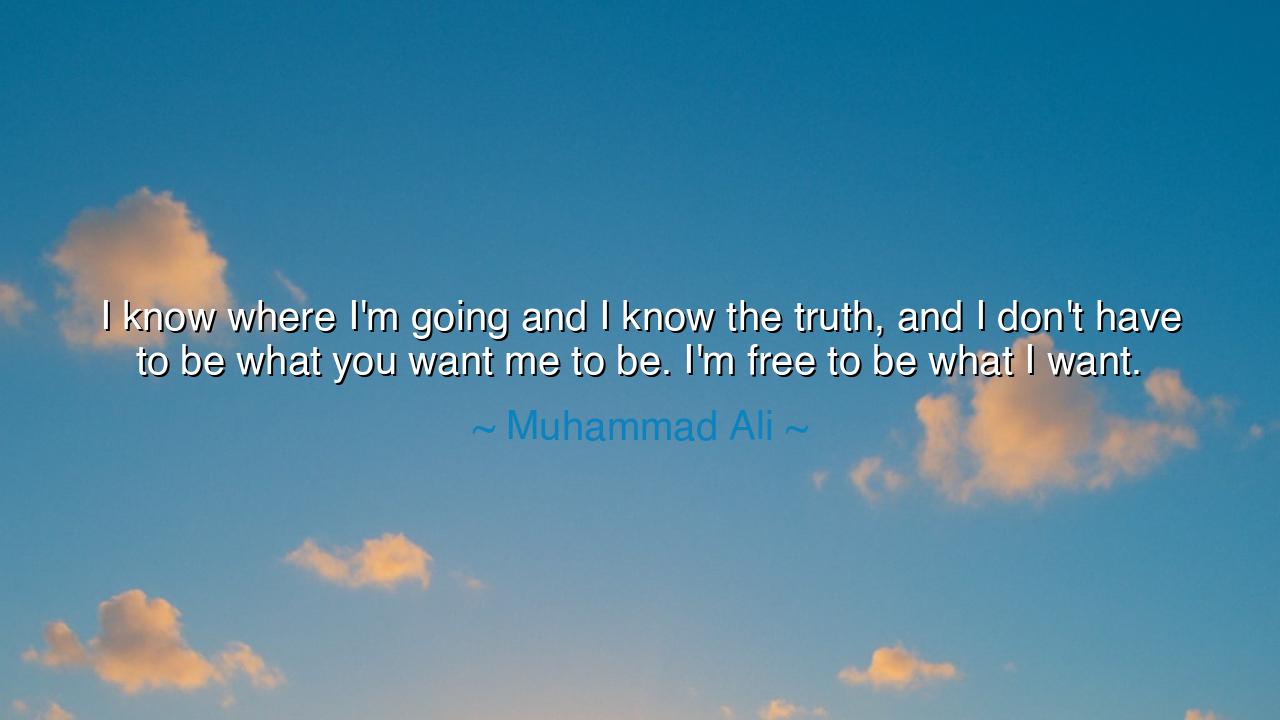
I know where I'm going and I know the truth, and I don't have to
I know where I'm going and I know the truth, and I don't have to be what you want me to be. I'm free to be what I want.






Hear, O listener, the thunderous words of Muhammad Ali, the fighter who was more than a fighter, the man who made his life a testament to courage and conviction: “I know where I’m going and I know the truth, and I don’t have to be what you want me to be. I’m free to be what I want.” These words are not the boast of arrogance, but the roar of a soul that has broken its chains. They speak to the eternal struggle of man against the forces that would mold him into something lesser, quieter, safer. In them lives the call to self-mastery, to freedom, to authenticity.
To know where you are going is to walk with purpose. Most wander, tossed by the winds of opinion, bending to the will of others, unsure of their path. But the one who knows his destination cannot be turned aside. Ali knew his path—both in the ring and beyond it. He would not be merely an entertainer for the crowds, nor a pawn for politics. He had fixed his eyes upon truth, and with that vision he could endure scorn, exile, and even the stripping of his crown. For the one who knows his road fears not the detours imposed by others.
To know the truth is a rarer and harder gift. Many live not by truth but by convenience, adjusting their beliefs to please those around them. But Ali spoke of truth as a rock beneath his feet, something that no man could take from him. When he refused conscription into the Vietnam War, he did so not in ignorance of the cost but in knowledge of his truth: that his conscience would not allow him to fight in a war he did not believe in. He lost years of his career, was vilified by the press, and risked prison. Yet his truth endured, and in time the world recognized his courage.
The words “I don’t have to be what you want me to be” strike like lightning. The world loves to shape men into its image—obedient, silent, compliant. Ali refused. He would not play the role expected of him: the quiet Black athlete who entertained and bowed. He chose instead to stand as himself, loud, proud, unyielding. In doing so, he taught millions that true greatness comes not from pleasing others, but from living without apology in the light of one’s own soul.
And then comes the heart of his declaration: “I’m free to be what I want.” Freedom, in its highest form, is not the absence of chains on the body but the absence of chains on the spirit. Ali was caged by neither the government, nor the critics, nor even the laws of his time. Though he lost titles, wealth, and years of his prime, he kept the one treasure no one could take: the freedom to be himself. That freedom made him greater than any belt or trophy could.
Consider also the example of Rosa Parks, who in quiet defiance on a Montgomery bus echoed the same spirit. She too said by her action: “I don’t have to be what you want me to be. I’m free to be what I want.” By refusing to surrender her seat, she refused the role forced upon her. That act of truth changed the course of a nation. She, like Ali, knew where she was going, knew the truth, and claimed her freedom to walk in it.
O listener, take this teaching into your heart. The world will press upon you with expectations, trying to bind you with the weight of “what you should be.” But if you know where you are going, if you know the truth within yourself, then no outside voice can enslave you. Stand firm. Speak boldly. Be free to live your own destiny, not the borrowed script of others.
Thus the words of Ali endure: “I know where I’m going and I know the truth, and I don’t have to be what you want me to be. I’m free to be what I want.” Let them be a shield against conformity and a sword against fear. Live not as a shadow cast by others, but as a light blazing with your own fire. For the world does not need you as another copy—it needs you as yourself, fully, fiercely, and free.






AAdministratorAdministrator
Welcome, honored guests. Please leave a comment, we will respond soon